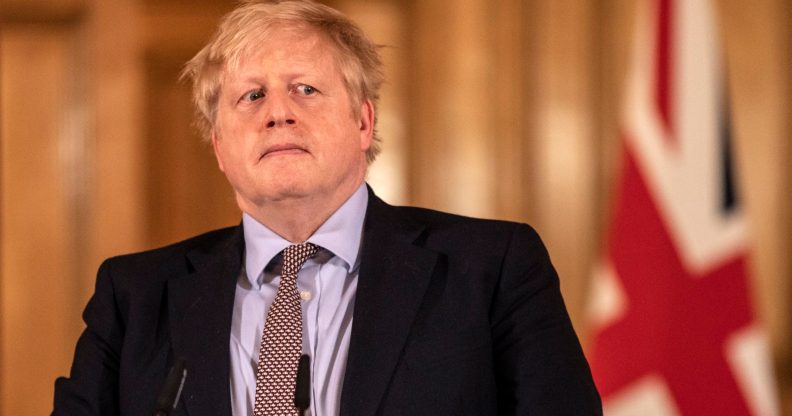Boris Johnson warned ‘regressive’ anti-trans plans would put vulnerable trans women at risk of violence

Boris Johnson. (AFP via Getty/ RICHARD POHLE/POOL)
Human Rights Watch has written to UK prime minister Boris Johnson calling his alleged plans for trans rights “discriminatory and regressive”.
The international human rights organisation strongly condemned reports that Johnson is abandoning plans to reform the UK’s Gender Recognition Act (GRA) and will instead bring in “new protections” for women’s spaces that would see trans people banned from public single-sex spaces.
The open letter from HRW’s UK director, Benjamin Ward, says: “I write to request that your government uphold the United Kingdom’s human rights obligations by reforming the Gender Recognition Act (GRA) to allow for self-identification and recognition of transgender and non-binary people.
“Reports that the government might abandon plans to reform the GRA and that it might explicitly exclude transgender women from ‘women-only’ spaces run counter to the Conservative party’s commitment to LGBT rights and would undermine the UK’s leadership on LGBT issues globally.”
Alleged single-sex spaces plan would put trans women at risk of violence.
Johnson and his equalities chief, Liz Truss, have responsibility for long-delayed reforms to GRA — the process that trans people have, since 2004, used to gain legal recognition of their gender in the UK.
Truss sparked widespread alarm on April 22 when she set out her plans for GRA reform, which drastically differed from the potential reforms set out by Theresa May’s government and seemed to instead repeat anti-trans talking points.
But The Sunday Times reported last weekend that Truss and Johnson allegedly plan to scrap the long-delayed GRA reforms and instead bring in “new protections” for women’s spaces that would bar trans women from using them. The government has not confirmed or denied the report.
There is no evidence that allowing trans women access to women-designated spaces, which has been the case for a number of years, puts other women at risk.
“The right to recognition as a person before the law is guaranteed in numerous human rights treaties and is a fundamental aspect of affirming the dignity and worth of each person,” Ward wrote.
“Under the current Gender Recognition Act, trans and non-binary people in the UK face significant barriers to legal recognition because they must provide evidence of a gender dysphoria diagnosis and demonstrate they have been living in their gender for two years.
“UK government research published in 2018 showed that 44 per cent of trans respondents cited not having fulfilled the existing requirements under the GRA as their reason for not changing their legal gender.
“We are particularly concerned by media reports suggesting that the government plans to exclude trans women from women-only spaces. This would be a seriously regressive and discriminatory step.
“The government’s own 2018 consultation on the GRA states clearly that ‘trans and non-binary people are members of our society and should be treated with respect’.
“However, this proposal would force trans women to use male facilities, despite strong evidence that this puts them at risk of violence.
“Conversely, there is no evidence that allowing trans women access to women-designated spaces, which has been the case for a number of years, puts other women at risk.
“In line with international human rights standards and medical best practice, Human Rights Watch recommends that the government reform the GRA to allow for a transparent, accessible administrative process for legal gender recognition based on self-identification.
“We urge you to reject any policies that would subject trans women to discrimination and expose them to harm, in particular by denying them access to safe spaces for women.”
The government is expected to publish its response to the public consultation on GRA reform before the summer recess on July 21.

